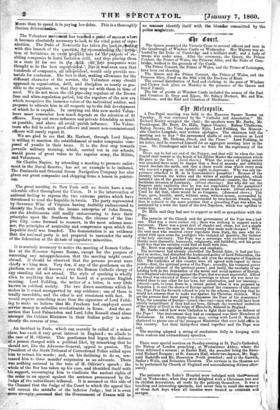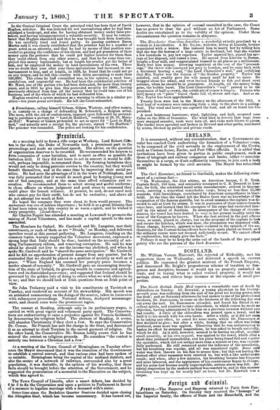311ttrepo1io.
A Pro-Papal meeting was held in the Hanover Square Rooms on Tuesday. It was convened by the "Catholic Aid Association." Mr. Richard Keeley occupied the chair; the speakers were Mr. Burke, Mr. Prendergast, Mr. Brett, Dr. Hine, Signor Gianini. Bishop Ullathorne, Bishop Brown, the Vicar Apostolic Kyle, Lord Feilding, the Honour- able Charles Langdale, sent written apologies. The chairman told the
meeting not to fear "the envenomed shafts of such enemies as Lord Shaftesbury, Mr. Dickens, Pteneh, and the Times." Lord Feilding, in
his letter, said he reserved himself for an aggregate meeting later in the year. Mr. Prendergast said he had no fears for the supremacy of the _Pope. There can be but one end of the Papacy, and that will be when the last Pontiff shall restore to the hands of his Divine Master the commission which
He gave to the first. (Loud cheers.) When the source of living waters
was attacked there must be danger that a flood of anarchy and infidelity would desolate the earth, and that a chaos would arise which every man who was not a pagan or an infidel ought to deprecate. Why was any im- portance attached to M. de is Gueronniere's 'pamphlet ? Because of the identity between the writer and the writer of another pamphlet, which heralded one of the greatest crimes ever committed—namely, the Franco-
Sardinian invasion of Lombardy. (Great cheering.) But why did not the Emperor state explicitly that he was not responsible for the pamphlet ? Until he did that, no person could put trust in his words. (Great cheering.) Until he did that, there would be no Congress. (Renewed cheers.) The Pope, poor, humble, meek, without arms,- without money, surrounded by
enemies, and, what was worse, surrounded by treacherous friends, might then be reduced to the same position that a preceding Pope was when he paralyzed by a word the hand of the first Napoleon, which was uplifted to strike him.
Dr Hills said they had met to support as well as sympathize with the Poise. e enemies of the Church said the government of the Pope was a bad one. That was a mere cuckoo cry ; there was nothing to support such a
statement. There was a great deal of slander and abuse, but not a single
fact. Who were the men in this country that made such charges ? Why, the very men who received every reprobate from Italy, the men who re-
ceived with open arms the profligate who violated all morality, the violator of the holy sanctuary. The Pope was a sovereign who exercised his au- thority most discreetly, humanely, religiously, and faithfully, and his great fault was that his enemies could find no fault with him.
Mr. Brett was especially sanguine and emphatic. The movement had already electrified the British Isles ; it had put Ire- land in motion, had disturbed the hackneyed policy of Lord Palmerston, the placid tortuosity of Lord John Russell, and even the strategies of Napoleon III. The Catholics of this country were all agreed with regard to three points—first, the spiritual power of the Pope ; secondly, his temporal power as a divine adjunct of the spiritual power ; and lastly, the necessity of up- holding both as the foundation of the moral and social systems of Europe. As to England's declaiming against the Pope, that was most ungrateful. Alfred the Great was educated at Rome—the sovereign to whom she was more in-
debted than to any other for her laws, her constitution, and her learning- (cheers)—and, to come down to a recent period, when it was proposed by Napoleon I. to seal the shores of Europe against the commerce of this coun- try, Pope Pius the Seventh refused to join in the scheme, observing that he would not consent thus to make war against his Christian children. Who are the persons that were going to dispossess the Pope of his dominions ? Why, the assassins of Europe—Or:trek cheering)—men who would have been utterly insignificant if they had not been, through the wretched imitation of the policy of Cecil in the reign of Elizabeth, fostered in England. Mr. Burke asked how were Catholics to fight their battle in defence of the Pope ? One instrument they had at command was their Members of Parliament. In 1846, ,thirty-three men voting with Lord G. Bentinck shattered to pieces one of the strongest Ministries that ever held office in this country. Let their thirty-four stand together and the Pope was safe.
The meeting adopted a string of resolutions fully in keeping with these zealous and extraordinary speeches.
There were special services on Sunday evening at St. Paul's Cathedral, the Bishop of London preaching ; at Westminster Abbey, where the Dean delivered a sermon ; at Exeter Hall, the preacher being the Reve- rend Richard Burgess ; at St. James's Hall, where two laymen, Mr. Regi- nald Radcliffe and Mr. Brovrnlow North preached ; and at the Garrick, Sadler's Wells, and Britannia Theatres. The services in the theatres are to be performed by Church of England and nonconforming divines alter- nately.
The patients at St. Luke's Hospital were indulged with theifoannual ball on Wednesday, when they were delighted with a Christmas tree and its childish decorations, all made by the patients themselves. It was a touching and interesting, spectacle, and never fails to recall the memory of those dark days when all lunatics were treated as criminals and
Wages . _ In the Central Criminal Court the principal trial has been that of David I Hughes, solicitor. He was indicted for not surrendering after he had been adjudged a bankrupt, and also for having obtained money under false pre- tences, and having misappropriated a valuable security. It may be remem- bered that Hughes absconded and that he was brought back from Australia. He was carefully tried and found guilty. In passing sentence Baron Martin said it was clearly established that the prisoner had for a number of years acted as an attorney, and that he had by means of that position suc- ceeded in gaining the confidence of his clients, and had got possession of their money upon the pretence that he could get higher interest for them than they could obtain from any other source, and that he for some time em- ployed this money legitimately, but at length his avarice got the better of and he employed the money in land speculations of his own. There was no doubt that year after year those speculations had increased in em- barrassment to him, and at length, in 18,%, he found that he could not go on any longer, and he left this country with debts amounting to more than 160,000/. The crime he had committed was, in his opinion, a most base, scandalous, and ungrateful one. He had been the confidential solicitor of Mr. Hunt, one of the parties who had been defrauded, for more than twenty years, and in 1855 he give him this pretended security for 10001., having previously obtained from him all the money that he could take out of his business, and of the whole of which he had defrauded him.
Hughes received a severe sentence as a warning to others in a similar po- sition—ten years penal servitude. He left the Court astounded.
A Frenchman, calling himself Gibson, Gilson, Wastcme, and other names, is in custody on a charge of defrauding M. SchendeR, a Belgian artist. The man, with the aid of confederates, imposed upon Sehendell by pretend- ing to purchase a picture for "Lord de Radford," residing at 29, St. Mary- at-Hill! Wastone or Gilson pretended to act as agent for "Lord de Had- ford," and actually sent a receipt foe, the picture, signed "Dc Hadford." The prisoner was remanded. The police are looking for his confederates.



























 Previous page
Previous page